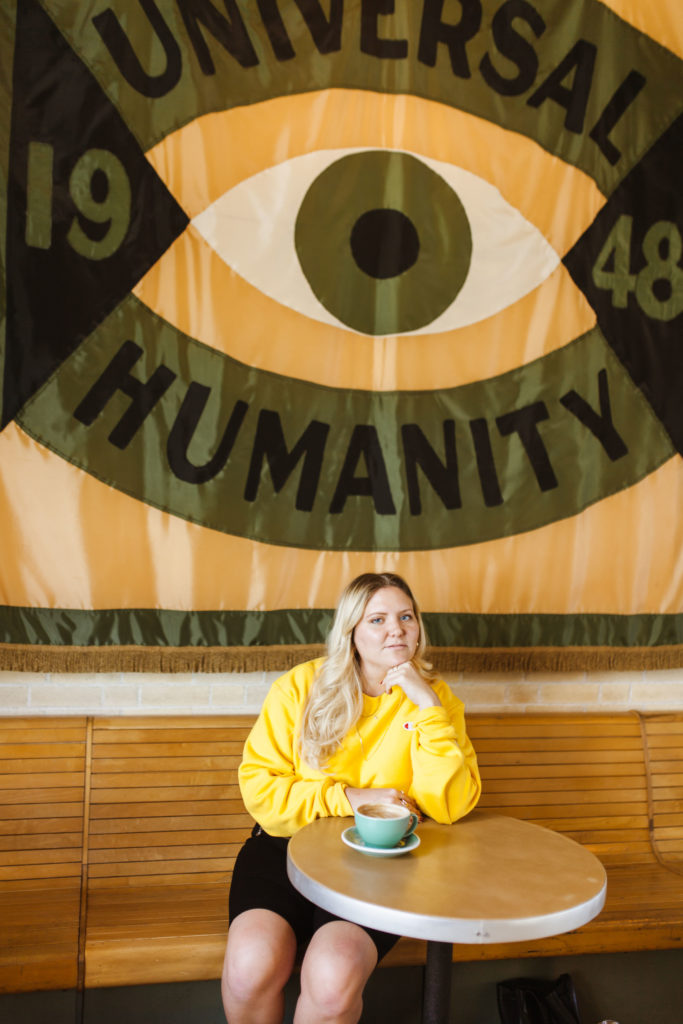In the wake of the coronavirus-induced SXSW cancellation, small-business owners, creatives and women in the service industry are struggling to make up lost revenue.
By Courtney Runn, Jenny and Diego Munar picture courtesy of the Munars, Mélat picture by Moyo Oyelola, Arielle Olfers picture courtesy of Arielle Olfers

Emergency appendix surgery on Jan. 31 left DJ Cassie Shankman with an unexpected medical bill and unable to work for most of February. Hauling her equipment around town and standing for hours on her feet wasn’t an option. Her expenses for the month were much higher than normal, but she wasn’t worried; the gigs she had booked for South By Southwest would more than cover her bills.
When Mayor Steve Adler announced the festival was canceled due to the coronavirus, Shankman immediately lost $8,225. Without the last-minute gigs she’s used to booking during the festival and the lost networking opportunities, she expects to lose even more money.
While small-business owners and artists knew cancellation was a possibility after big brands started pulling out of the festival, it still came as a shock to many that the 34-year-old tradition was officially called off.
“I know beautiful things will come out of it but it will be really hard for everybody for a long time,” Shankman says.
At risk for catching coronavirus herself with severe asthma, Shankman is sympathetic to the city’s decision to cancel the festival but right now, she’s angry. She had already turned down gigs to take on more for SXSW and hired other female DJs for her festival sets.
“To have [SXSW] taken away is truly devastating,” she says. “I don’t think it’s anyone’s fault. It all sucks that we rely on this and I think that’s the nature of creativity and creative work.”
Many Austinites like Shankman rely on SXSW revenue to pay business expenses and carry them through stagnant months. For husband-and-wife team Jenny and Diego Munar, March is the busiest month of the year with triple the business for their balloon-installation company. This year, they had events scheduled with Amazon, Google, Twitter, Capital Factory and more private clients; all were canceled, costing them $10,000 in nonrefundable balloons and supplies. The couple was planning on using that money to move their business out of their home. They already called their realtor, apologizing that they can no longer pursue the warehouse they were interested in.
“We just need work,” Diego Munar says. “We’re not expecting donations from people or anything.”
While fundraisers are already in place for business owners like the Munars, they emphasized others need the donations more.
“We have very close friends who are florists and you know we are vendors so we are all connected together in some way and we really feel for them,” Jenny Munar says. “Oh my god, what can they do with so many flowers?”

Diego and Jenny Munar, Mêlat, Arielle Olfers
For many creatives, lost connections and networking opportunities can be just as devastating to business as lost revenue. Musician Mélat lost every gig she had booked and future gigs she would’ve booked through networking. In 2018, she performed in Washington, D.C. for World Refugee Day, a spot she landed after playing SXSW earlier that year.
“As long as I’ve been alive, South By has been alive,” she says. “It’s existed longer than I’ve been on this planet. [For] a lot of us who are coming up at this point of time, it’s become a staple in our yearly activities and it’s always been there and it’s been growing.”
As a native Austinite, Mélat grew up with the festival and says she’s still trying to wrap her mind around “what the ramifications will be.”
"I’m a big believer in everything having a purpose whether we understand it or not and maybe the bigger purpose here was to show...the creative community really coming and showing what they’re made of without all of all the hoopla that comes with South By," she says.
Arielle Olfers, founder of PR firm The Southern Influence, lost some video projects in the cancellation but is watching her own clients face weightier ramifications. P. Terry’s was scheduled to cater for festival volunteers while The Wayback was planning to host media and talent. Olfers says both clients immediately wanted to pivot to giving back to the community, with P. Terry’s CEO Todd Coever asking her, “How can we save SXSW as a restaurant?”
“That’s what we’re going to be focused on as a team and focus on with our clients is just how can we band together as a community,” Olfers says.
The cancellation brings up larger questions surrounding the massive growth of the festival and the Austin economy. For many Austinites, a homegrown, old-school version of SXSW is welcome from the corporate event it has become but it can’t replace the thousands of dollars already lost.
“We’re all crushed of course,” Olfers says. “But at the end of the day I’m kind of curious to see what happens...I don’t think I’ve looked forward to a Monday this much in a long time because Monday is going to be a busy day. How are we going to move onward?”








